Interview: Actor Alana Dietze on Leading the Cast in DIDO OF IDAHO
The West Coast premiere by The Echo Theater Company at Atwater Village Theatre
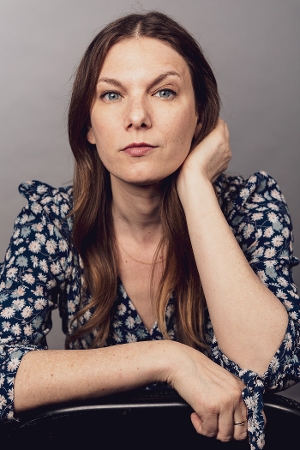
When I heard about the West Coast premiere of Abby Rosebrock’s Dido of Idaho by The Echo Theater Company at Atwater Village Theatre starring Alana Dietze (pictured), I knew I had to speak with her about the “wonderfully off-beat, darkly hilarious (in a truly cringeworthy way) comedy about female identity and the lengths to which some women will go for the love of a man.”
And since I last met Alana when she directed Dry Land, a drama about a high school girls' swim team and a DYI abortion organized in the team’s locker room, which opened at the Echo and went on to win all the awards that year at the CTG Block Party at Kirk Douglas Theatre in Culver City, I decided to speak with Alana about her career as an actor and director and why audiences will identify with the struggles faced by her character Nora in the play.
Thanks for taking the time to speak with me, Alana, as I know how busy you are with Dido of Idaho opening this weekend. Were you born in Los Angeles or educating here? If not, where?
I grew up in the Bay Area, but I came to Los Angeles to attend Occidental College as an undergraduate and never left. Los Angeles is definitely home now.
Do you remember the first play that inspired you to stay involved with theatre?
My most impactful early experiences with performance were through the creative problem-solving competition Odyssey of the Mind. I competed for a few years in performance-based problems in which I would work with a team of my peers to write and perform an original piece. The autonomy, creativity and collaboration generated by that experience hooked me on live performance.
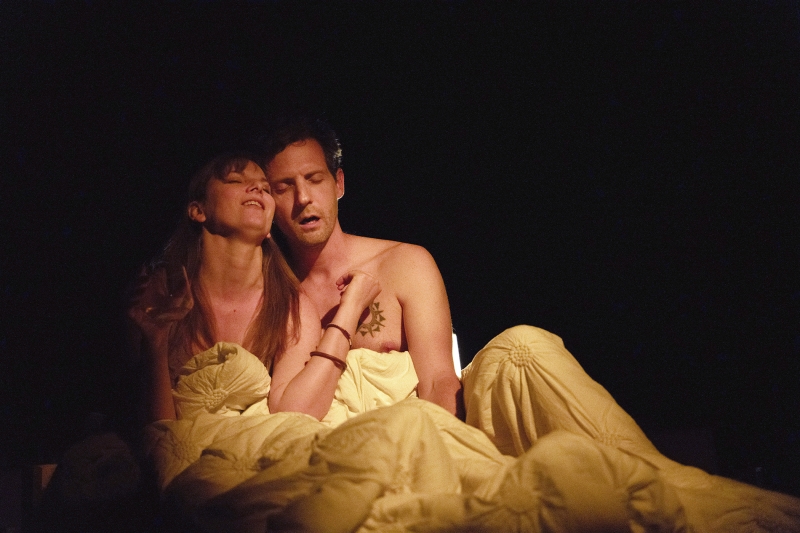
Alana Deitze and Joby Earle
Photo by Makela Yepez Photography
Tell me a bit about your background directing plays for Echo or elsewhere.
I started directing at the Echo in 2015 at the urging of Artistic Director Chris Fields. Chris knew how I thought about plays thanks to my position at the time as Literary Manager, and he thought I’d be suited to directing. I was initially resistant to the idea as I saw myself as a performer and not, particularly, as a leader. My first full-length production was Adam Bock’s play A Small Fire. Soon after that I read and fell in love with Ruby Rae Spiegel’s play, Dry Land which was really the play that turned me into a director.
I remember the intensity of Dry Land when I saw it at the Kirk Douglas Theatre. As a former high school teacher, I really got involved in the young girls’ emotional stories. Is that what first attracted you to want to direct it?
Dry Land is such a special play. and it was one of the first I’d ever read that captured the voice of contemporary young women in such a profound, funny, complex way. I have always been drawn to coming-of-age stories, especially those centering on women, and when I first read Dry Land it felt like a revelation. Sarah DeLappe’s The Wolves (which I directed in 2019) was making the rounds around the same time, which is equally compelling in capturing that sharp, modern voice. Since then, we have seen many more plays that center the stories on contemporary teenage women but, at the time, these plays felt novel. I had never heard my voice and that of my peers reflected onstage so clearly. These plays seemed to be filling a space in the theatrical landscape and asserting the importance of stories about young women who are so often dismissed as flighty, boy-crazy, or ditzy. I was also drawn to the focus on female friendship in both plays. So often young women have been relegated to a romantic context in story-telling and, while romantic and sexual relationships factor into both plays, the relationships between the young women are at their center.
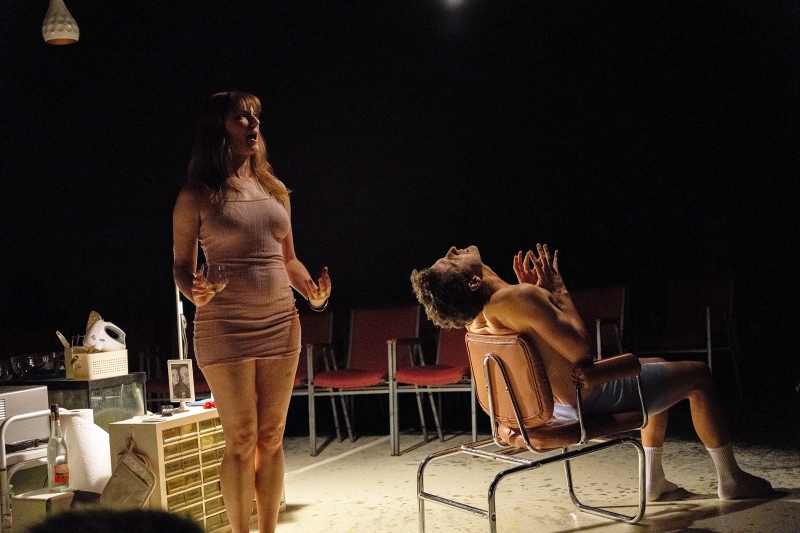
Alana Deitze and Joby Earle
Photo by Makela Yepez Photography
Now let’s talk about your acting career. What was the first play in which you appeared? And what is your fondest memory of that experience?
The very first play I appeared in was the junior version of A Midsummer Night’s Dream at my elementary school. I played Moth. I was six, so I mostly recall being sad that my costume wasn’t prettier because the wonderful parent who handmade it for me had been quite literal in her interpretation of Moth and chose a gray fabric as the base. But hey, as actors, part of our job is to be positive collaborators and engage with the vision and process of others.
What first attracted you to appear as Nora, the lead character in Dido of Idaho? Is there something about her story that speaks directly to you?
Nora is so many things that I strive to be: intellectual, witty, curious, expressive and deeply-feeling. She has also grown up in a world where she’s been taught that her value is dependent on the approval of others, men especially. No matter how successful, talented, and charming she is, she feels her worth can only be measured by how much she is loved and desired by others. I hate how much I relate to this, but I do.
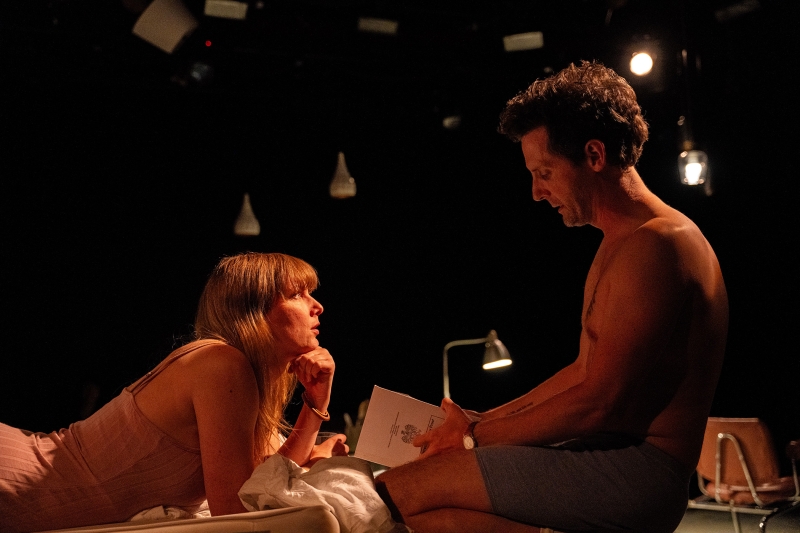
Alana Deitze and Joby Earle
Photo by Makela Yepez Photography
I think a lot of actors especially struggle with a need to be validated externally and society at large emphasizes that the worth of women is tied up in their ability to attract a partner who approves them as worthy of a lifetime commitment. Actors carry an additional layer of putting themselves on display through their work, making them vulnerable to the external gaze. We crave to be seen, and we also fear the judgment that can come with that. I am feeling it this week, as I head into opening. Like Nora, I strive to generate my sense of self-worth from within, but it is not a simple task. Nora knows this struggle deeply and the play is very much the story of her wrestling with that “question of her worth” (a phrase that comes from one of my favorite lines in the play).
How would you describe Nora’s storyline?
One of the wonderful things about this play is how surprising it is. Playwright Abby Rosebrock defies expectations at every turn, so I hesitate to say too much about the play’s plot as it may dilute the impact of seeing it unfold. Nora’s journey is a life-or-death battle towards self-discovery and acceptance. She starts the play deeply in love, and the requited commitment of the object of her desire feels like the most necessary and important question in her life. As her journey progresses, deeper layers reveal themselves as she works her way back to her core.
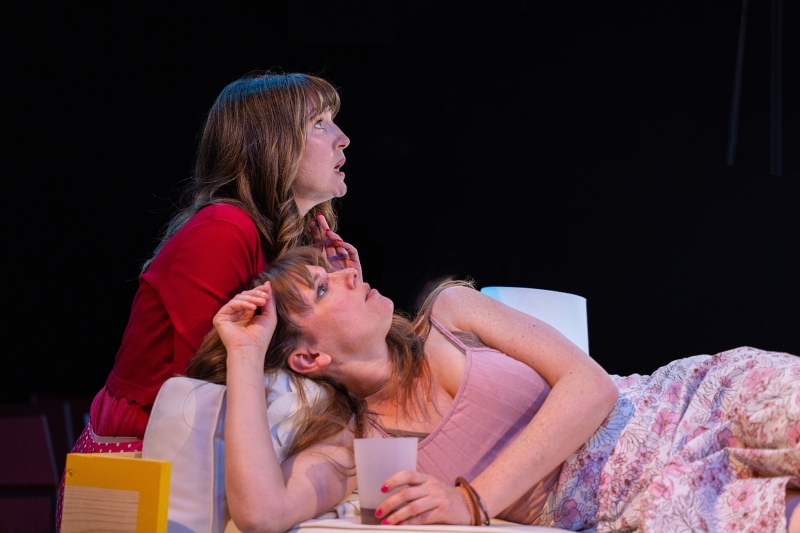
Nicole DuPort and Alana Dietze
Photo by Makela Yepez Photography
Have you worked with any of these actors before? Or director with Abigail Deser?
I directed Julie Dretzin, who is playing my mother (also named Julie), in the Echo’s 2017 production of Dominic Finocchiaro’s The Found Dog Ribbon Dance. It is such a joy to get to share the stage with her as she’s one of my most admired and adored actor-friends. I met Nicole DuPort, who plays Crystal, in an acting class some years ago and we’ve worked together for brief periods, but this is the first time we get to do a complete run of a show together. She is also a friend and someone whose work I have loved watching in the past. Abigail and I have known each other some time now and have been looking forward to collaborating. This is our first project together.
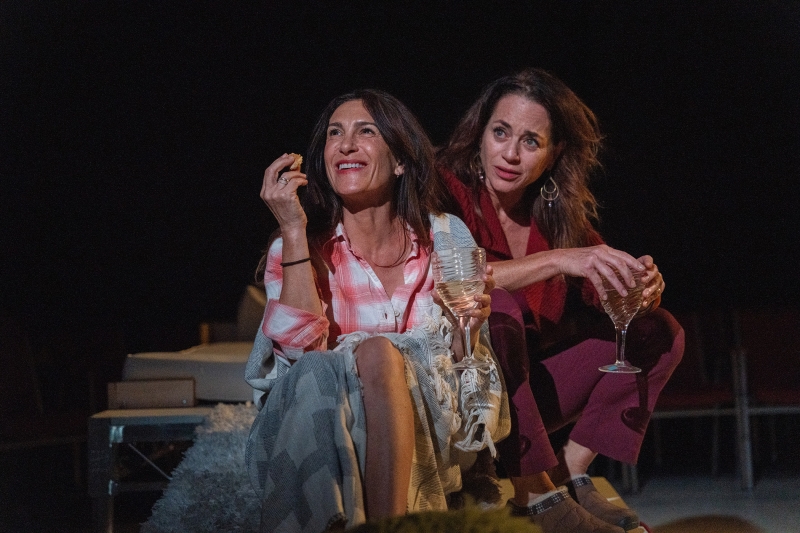
Julie Dretzin and Elissa Middleton
Photo by Makela Yepez Photography
Since you also direct, did you find it challenging to see the play in the same way your director did? Or was it a collaborative rehearsal process?
Abigail found an abstracted approach to the production design and staging of the piece that I don’t think I would have seen were I directing the piece, but it has created a wonderful playground for us actors to work in and a unique visual landscape for the world of the play. It’s always a little tricky to turn off my director-brain and give over to someone else’s vision when I’m acting, and I’ve had an especially long break from performing this time (nearly 5 years!) but, Abigail has a deeply encouraging presence as a director and it has definitely been an open and collaborative rehearsal process.
Back to the storyline. Where was Nora living before she left for Idaho?
Nora grew up in Atlanta, GA. She moved to Moscow, Idaho, where the play begins, when she got a job as an adjunct musicology professor at the University of Idaho.
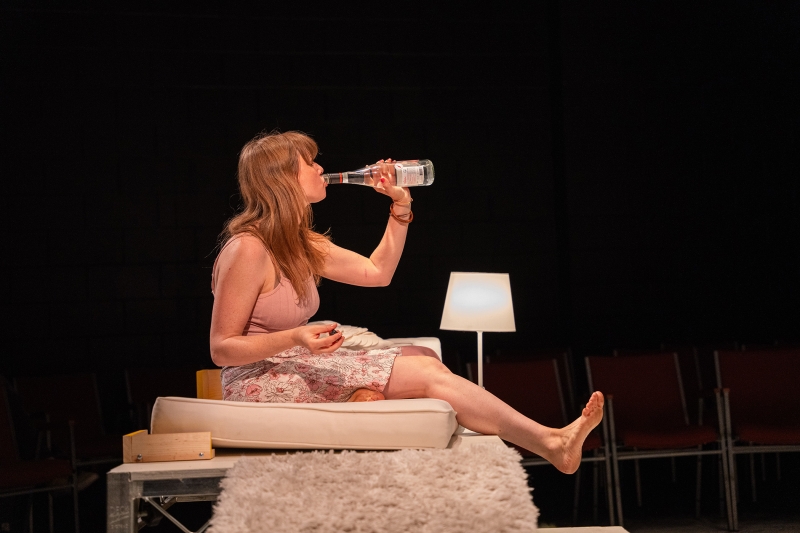
Alana Deitze
Photo by Makela Yepez Photography
Does she like it in Idaho or just want the emotional support she hopes her mother will provide?
Nora came to Idaho for a job and she is great at her work, but she is struggling financially and emotionally. Her primary aspiration, at the play’s start, is to lock down a romantic partner. She dreams of a “wholesome and blissful domestic existence” that she believes can only come from the love and acceptance of the man with whom she is having an affair. Her career, though she’s highly educated and intelligent, and her estranged relationship with her mother, are secondary to this fairy-tale dream. Through the play’s journey she starts to uncover that her priorities have perhaps been misplaced.
Does Nora approve of her mother’s new partner? Or does she see her as a threat for her mother’s attention? Does her arrival create more tension than emotional support?
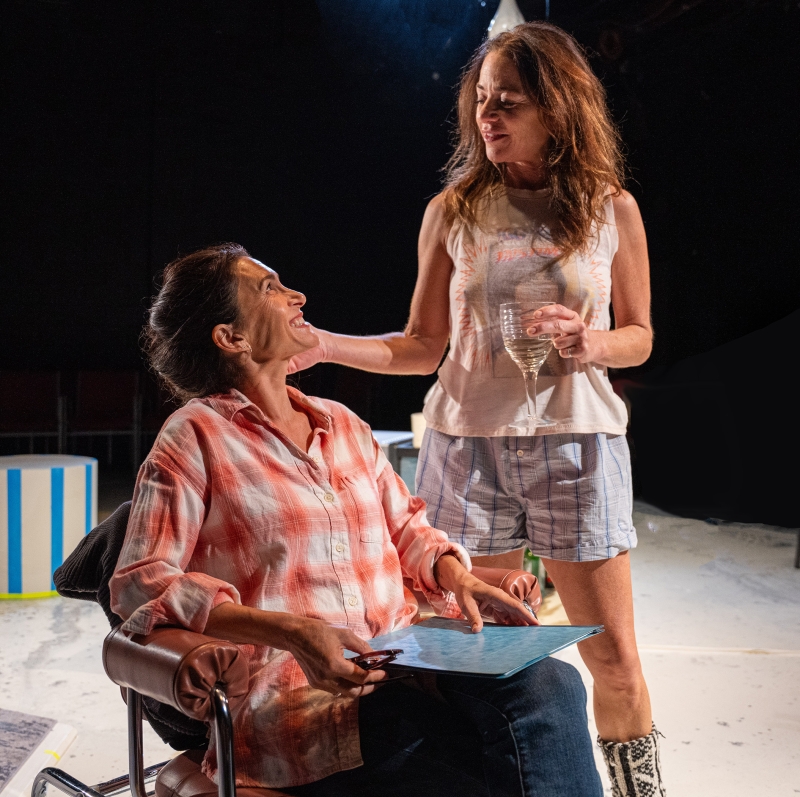
Julie Dretzin and Elissa Middleton
Photo by Makela Yepez Photography
Nora has always hoped that her mother would find love and believed that a romantic partner could soften her mother’s attitude and opinion of her. She has felt harshly criticized by her mother in the past and often blamed Julie’s loneliness for her punishing nature. She is excited by the presence of her new partner and hopes that together they can build a new family dynamic, but Julie and Nora have a lot of work to do to heal their relationship before that can happen.
The title of the play is derived from the mythological story of the recently widowed Queen Dido and Aeneas who had a passionate love affair. But as soon as he learns the gods have assigned him another, more glorious fate, Aeneas abandons Dido, whereupon she kills herself in rage and despair. How does that relate to what happens to Nora in the play?
Nora’s greatest fear is abandonment and her greatest desire is for a deep, true, and abiding love. She relates to Dido because she too has felt discarded for much of her life, even when she’s given her whole self to another. She understands the despair Dido feels in her abandonment and fears that she could suffer a similar fate. Nora’s relationship with the myth of Dido and Aeneas drives much of her thinking about the way women are treated in the world, especially in romantic relationships, but it is her relationship with herself that becomes the crux of the play’s journey.
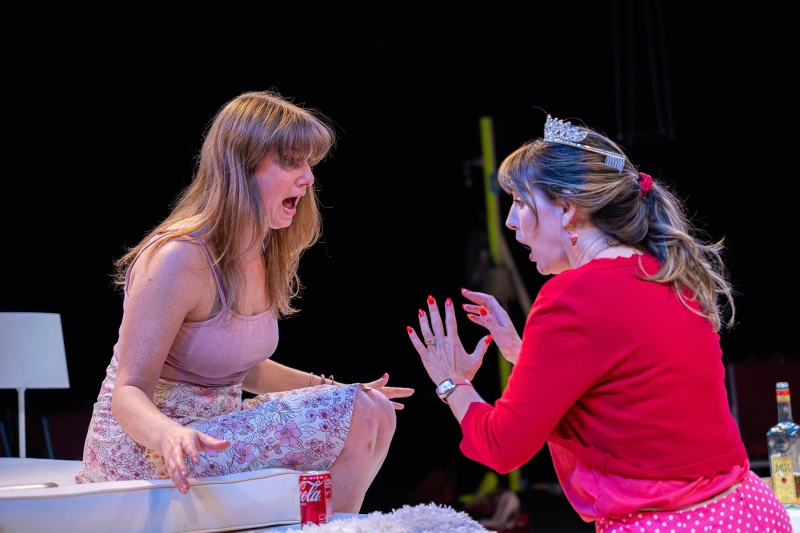
Alana Dietze and Nicole DuPort
Photo by Makela Yepez Photography
Dido of Idaho’s director Abigail Deser describes your character this way: “Nora faces her own potential annihilation because she only knows how to exist in the reflection of the male gaze. Self-love is the only beacon that might help her find her way back to safe shores.” That rings true for so many people, doesn’t it, that they never learn to live their own lives before attaching theirs to someone else? Or just feel hopeless of ever truly being loved. Is that how you see Nora?
I definitely think this is a huge part of Nora’s struggle. The whole concept of “self-love” can feel foreign and inaccessible in a culture where we’re taught that our worth is determined by our looks, how much money we make, or the power we wield in the world. It is easy to understand intellectually the importance of recognizing our own worth, but in practice this is exceptionally difficult to live by. How many people truly do not care what others think of them? Is it possible to generate self-love without feeling loved from the outside? Whether romantic or societal, it is difficult to feel our worth when we don’t feel externally valued as well.
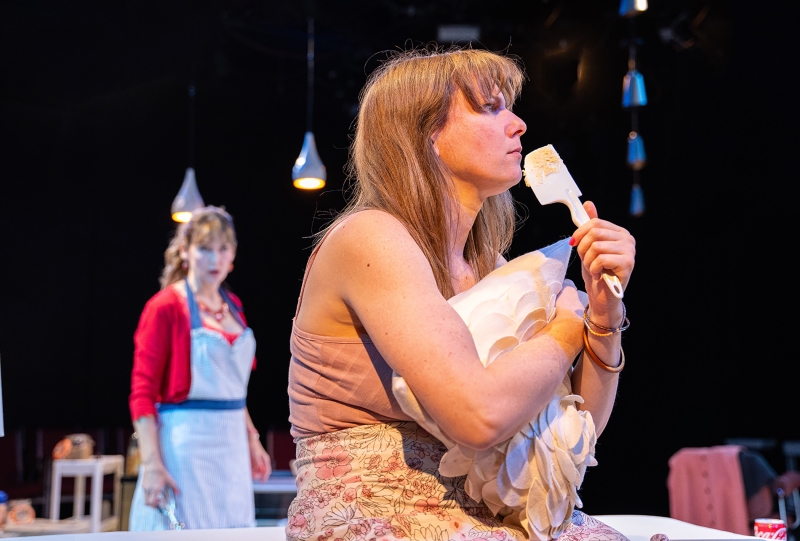
Nicole DuPort and Alana Dietze
Photo by Makela Yepez Photography
It sounds like such a serious and emotionally intense play. How did the playwright make so much tension between the characters feel less emotional intense for the audience?
I don’t think we WANT the play to be less emotionally intense for the audience. Don’t we go to the theater, in part, in search of catharsis? When I watch a play I want to feel what the characters feel — to see myself reflected in their experience. That said, Abby’s writing is also voraciously funny. In fact, I think it is because it is so funny that the play is also so deeply felt. I hope that audiences experience the full pendulum of their humanity when they come to the theater.
No doubt almost every member of the audience will relate to how the end of a love affair can break your spirit and question your own decision-making abilities. Makes me think about the reason Queen Dido took her own life after Aeneas left her. Are there elements of self-harm in the play that make it cringeworthy?
The play is both physically and emotionally brutal at times. The audience may cringe, but they will also (hopefully) laugh and feel deeply.
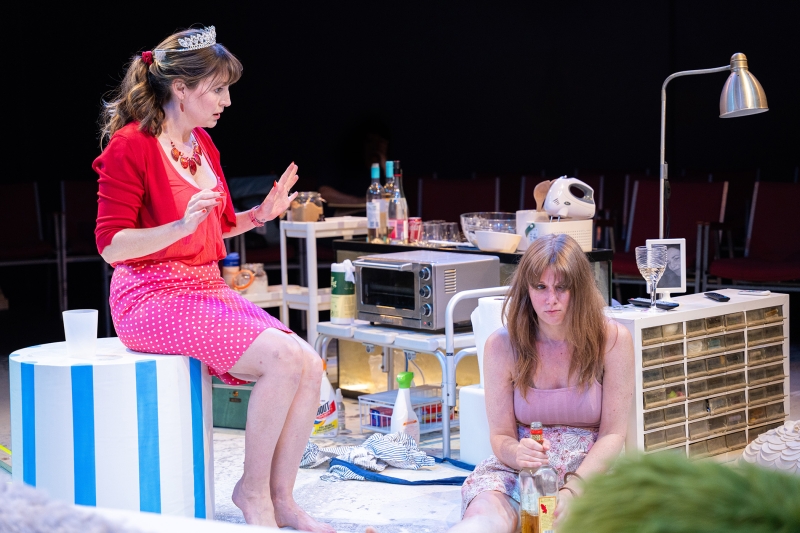
Nicole DuPort and Alana Dietze
Photo by Makela Yepez Photography
Is there anything else you would like to share about yourself or the play? Perhaps about your recent acting class which you described as being “for actors who might be a secret director or ever thought that better understanding a director’s process might help your acting”?
The class you reference is an Intro to Directing for Actors class that I devised as a way of guiding director-curious actors towards becoming actor-director hyphenates. I don’t have a formal education as a director, my training is as an actor. When I started directing, I had no idea what I was doing, but I also felt that my whole life had, in some sense, been preparing me to take on that role. I believe that directors who have been actors are extremely well suited to shaping performance, because they understand what it takes to live inside of a role. I started the class as a way of encouraging actors to explore directing and give them a sense of the parts of the process they may be unfamiliar with while also affirming how much they already know. The first section of the class was a great success and a ton of fun — I learned a huge amount from my students. I’m planning to start another section soon, possibly late summer or fall, once Dido is up and running.
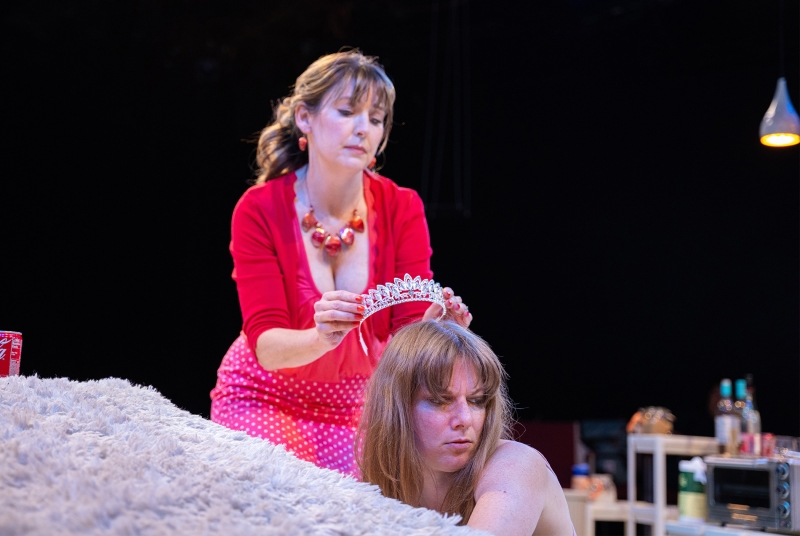
Nicole DuPort and Alana Dietze
Photo by Makela Yepez Photography
Is there one or the other you personally prefer, directing or acting?
Acting can be more joyful for me because directing comes with so many additional responsibilities. By the same token, directing often feels like a greater accomplishment because the director gets to touch everything. I love both, and I love that directing affords me opportunities to work on plays for which there may not be a role that I’m right for. For now, I’m thrilled to get to be onstage and live inside of Nora’s complicated, passionate mind in Dido of Idaho.
Thanks so much, Alana! Break legs this weekend!
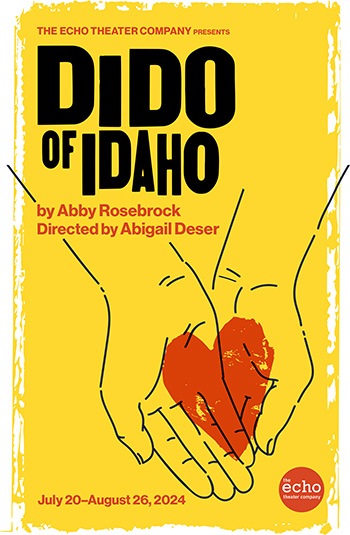
Dido of Idaho opens on Saturday, July 20, with performances continuing Fridays and Saturdays at 8 p.m.; Sundays at 4 p.m.; and Mondays at 8 p.m. through August 26. Three preview performances are set for Wednesday, July 17; Thursday, July 18; and Friday, July 19, each at 8 p.m. Tickets are $34 on Fridays, Saturdays, and Sundays. All Monday night performances, as well as previews, are pay-what-you-want. Atwater Village Theatre is located at 3269 Casitas Ave. in Los Angeles, CA 90039. Free parking is available in the Atwater Crossing (AXT) lot one block south of the theater. For more information and to purchase tickets, call (747) 350-8066 or go to www.EchoTheaterCompany.com.
Comments

Videos

